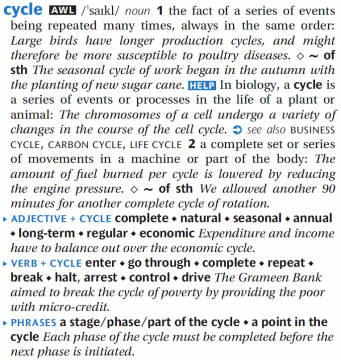 Diana Lea is editor of the Oxford Learner’s Dictionary of Academic English (OLDAE), published in January this year. In this article, she looks at what academic vocabulary is and how it differs from general English vocabulary. Diana will be speaking about the OLDAE at IATEFL 2014 on Wednesday 2nd April.
Diana Lea is editor of the Oxford Learner’s Dictionary of Academic English (OLDAE), published in January this year. In this article, she looks at what academic vocabulary is and how it differs from general English vocabulary. Diana will be speaking about the OLDAE at IATEFL 2014 on Wednesday 2nd April.
Is academic vocabulary fundamentally different from general English vocabulary? In creating the Oxford Learner’s Dictionary of Academic English (OLDAE), we were compelled to think very carefully about this question in order to decide what should and should not be covered in such a dictionary. Fortunately, other researchers had already put in a lot of work in this area. Our starting point was the Academic Word List (AWL) (Coxhead, 2000), which will be familiar to most teachers of EAP: 570 word families that will account for roughly 10% of most written academic texts. But these words are all included – and marked – in learners’ dictionaries already. What more is needed?
A word list is a useful tool for setting targets and monitoring progress, as students can tick off words that they ‘know’ – but it does not actually teach. What does it mean to ‘know’ a word?
In the first instance, obviously, you need to know what it means. For some words this will be relatively easy, because they carry roughly the same meaning in most contexts, for example achieve. Other words have a number of different meanings; many of these may be related to each other, but used in slightly different ways (e.g. capital). Yet other words have a quite specific meaning in a particular area of study: consider the use of the words variable and significant in the context of statistics. It is fair to say that academic writing generally takes a more precise and nuanced approach to meaning than much of the speech and writing that we encounter day to day. To understand academic vocabulary in context, students will benefit from an account of these words that is based on genuine academic usage, not general usage. That means a corpus of academic English.
The 85-million-word Oxford Corpus of Academic English contains undergraduate textbooks and academic journals drawn from a range of disciplines across the four main subject areas of physical sciences, life sciences, social sciences, and humanities. Analysis of this corpus enabled lexicographers to give a precise and nuanced account of the meaning and use of words in academic writing. For there is more to knowing a word than just knowing what it means: if students are to use a word correctly and effectively in their writing, they need to know how it behaves in context and how it combines with other words. As one teacher we interviewed said of her own students, ‘They know many words in isolation, but usage they find difficult.’
A complete account of a word in a learner’s dictionary of academic English needs to cover its meaning – or meanings – its grammar, any prepositions or grammatical structures it commonly combines with, any peculiarities of usage in particular disciplines, useful synonyms, and – for the most important words – lists of collocations in different grammatical relations. And all these points need to be supported by example sentences that are clear, illustrate the points well, and are based on authentic academic texts.
 The entry for cycle only includes the meanings that are important in academic writing. This enables the academic meanings to be treated in more detail.
The entry for cycle only includes the meanings that are important in academic writing. This enables the academic meanings to be treated in more detail.
A more precise meaning that is particular to biology is identified in a ‘HELP’ note.
Cross-references indicate entries for compound words with their own precise definitions.
The example sentences show genuine academic usage, based on the texts in the Oxford Corpus of Academic English.
Complementation patterns with prepositions or other words are clearly signposted before the examples that illustrate them.
Collocations and common phrases are shown and exemplified in a special section of the entry.
Academic vocabulary is the vocabulary needed to write clear, appropriate academic texts. It includes, on the one hand, a lot of ordinary general vocabulary – but transposed to an academic context. At the other extreme, there is specialist subject vocabulary. This differs between different academic disciplines and can be highly technical; typically, students will need to learn these words as part of their subject studies, whether or not they are also learners of English. In between these two extremes is the ‘general academic’ or ‘subtechnical’ vocabulary represented by the AWL. The OLDAE covers the AWL, plus all the general vocabulary needed for defining it, plus the synonyms, opposites and collocates of all these words.
A word list is a useful starting point but a dictionary sets the words in context and enables students to use them effectively in their own writing.
Reference
Coxhead, A. (2000). ‘A New Academic Word List’, TESOL Quarterly, 34(2): 213–238. See also www.victoria.ac.nz/lals/resources/academicwordlist/


Reblogged this on amengental.
[…] #IATEFL – What exactly is ‘academic vocabulary’? […]
[…] #IATEFL – What exactly is ‘academic vocabulary’? […]
Reblogged this on hungarywolf.
[…] Diana Lea is editor of the Oxford Learner's Dictionary of Academic English (OLDAE), published in January this year. In this article, she looks at what academic vocabulary is and how it differs from… […]